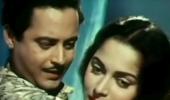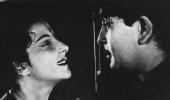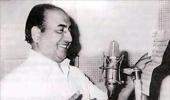
Suman Kalyanpur, who was awarded a Padma Bhushan in the Republic Day Honours List three days before her 86th birthday on January 28, had the good fortune of sounding similar to Lata Mangeshkar, but the blessing turned out to be a bane, as she was sometimes branded a poor man's Lata Mangeshkar.
A similar career pattern can be seen for actress Nanda, who always remained in the shadow of Meena Kumari.
Kalyanpur's most successful phase started when Lataji stopped singing with Mohammed Rafi for four years in the 1960s.
The duets meant for Lataji went to Suman Kalyanpur.
She sang the chartbusters Aaj Kal Tere Mere Pyar Ke Charche in Brahmachari, Tumse Oh Haseena Kabhi Mohabbat Na Maine Karni Thi in Farz and Ajhu Na Aaye Balma in Saanjh Aur Savera.
Madan Mohan, who swore by Lataji's vocals, had to bring in Kalyanpur for the evocative duet Baad Muddat Ke Yeh Ghadi Ayee with Rafi in Jahan Ara.
One of her earliest successes in Hindi cinema was Na Tum Humein Jaano in the Dev Anand murder mystery, Baat Ek Raat Ki. The number composed in 1962 by Sachin Dev Burman went to Kalyanpur as the composer was sulking with his favourite 'Lota' at the time.
It is not clear how Suman Kalyanpur felt about the constant comparison to Lataji, but she did forged a career of her own and sing tunes where she held her own.
Mere Mehboob Na Jaa in Noor Mahal is entirely Kalyanpur's song. Nobody mistakes the voice to be anyone's but hers. Another enchanting number was Sharaabi Sharaabi in Noor Jehan. The film featured Lataji's exquisite Raat Ki Mehfil Sooni Sooni and yet, Kalyanpur held her own.
In the plaintive Dil Gham Se Jal Rahe Hai in Shama, Kalyanpur is her own person.
Composer Ghulam Mohammed, who immortalised himself with Pakeezah, allowed Kalyanpur to share vocal honours with the legendary Suraiya, who sang all her songs herself while Kalyanpur sang for Nimmi.
It was a major break for the singer, as was 1964's Shagoon, where Kalyanpur sang two solos Bujha Diye Hain Khud Apne Haathon Se and Zindagi Zulm Sahi for Composer Khayyam.












 © 2025
© 2025